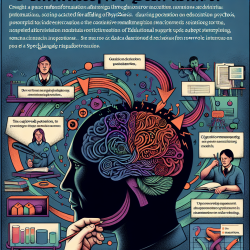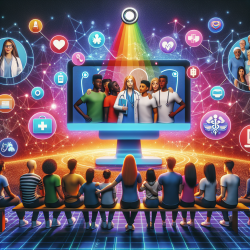As a speech-language pathologist dedicated to improving outcomes for children, the findings of the study "Telerehabilitation for Word Retrieval Deficits in Bilinguals With Aphasia: Effectiveness and Reliability as Compared to In-person Language Therapy" offer promising insights. This research provides robust evidence that telerehabilitation can be as effective and reliable as in-person therapy for bilingual adults with aphasia (BWA). Here, we'll explore how practitioners can leverage these findings to enhance their clinical practice.
Understanding the Study
The study compared the effectiveness and reliability of semantic feature analysis treatment for word retrieval deficits in BWA delivered via telerehabilitation and in-person therapy. The participants, 16 Spanish-English bilinguals, were divided into two groups: one receiving therapy in person and the other via telerehabilitation. Both groups showed significant improvements in word retrieval, with no notable differences in treatment effect sizes or secondary outcomes between the two modalities.
Key Findings
- Effectiveness: Significant improvements in word retrieval were observed in both groups, demonstrating that telerehabilitation can be as effective as in-person therapy.
- Reliability: High clinician adherence to treatment protocols was maintained across both delivery methods, indicating reliable implementation of therapy.
- Accessibility: Telerehabilitation can overcome geographical and logistical barriers, providing access to high-quality bilingual therapy for patients who may otherwise have limited options.
Implementing Telerehabilitation in Your Practice
To integrate telerehabilitation effectively, consider the following steps:
- Technology Setup: Ensure your practice has the necessary technology, including reliable internet, video conferencing software, and secure data management systems.
- Training: Provide thorough training for clinicians on the use of teletherapy platforms and protocols to ensure consistency and adherence to treatment procedures.
- Patient Preparation: Educate patients and caregivers on the use of teletherapy technology and provide support for setup and troubleshooting.
- Monitoring and Feedback: Regularly monitor treatment sessions and gather feedback from patients and clinicians to continuously improve the teletherapy experience.
Encouraging Further Research
While this study provides strong evidence for the effectiveness and reliability of telerehabilitation, further research is essential to explore its long-term benefits and potential challenges. Practitioners are encouraged to contribute to this growing field by conducting their own studies and sharing their findings with the broader speech-language pathology community.
To read the original research paper, please follow this link: Telerehabilitation for Word Retrieval Deficits in Bilinguals With Aphasia: Effectiveness and Reliability as Compared to In-person Language Therapy.










